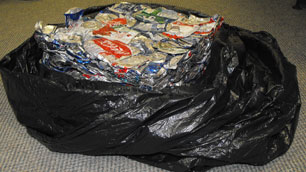Nunavut, Canada Ends Recycling Program
 Nunavut, Canada will not have a territory-wide recycling program, as the government has deemed the endeavour too costly to expand and maintain.
Nunavut, Canada will not have a territory-wide recycling program, as the government has deemed the endeavour too costly to expand and maintain.
Officials say it is too expensive to collect and ship bottles, cans and other recyclables out of Nunavut, which doesn’t have highways and therefore has items shipped in and out by air and sealift.
“The major challenges include, for instance, infrastructure, transportation, depot management and operations, and the development of recycling legislation. Those are the major ones,” Earle Baddaloo, Nunavut’s assistant deputy environment minister, told CBC News.
The government’s decision means a three-year pilot recycling program in Iqaluit and Rankin Inlet will end in December, and all future recyclables will join other waste at local landfills.
During the pilot program, residents in Iqaluit and Rankin Inlet could drop off their beverage containers at depots that would sort and prepare the recyclables for shipment to recycling facilities in southern Canada.
Environmental, financial impacts
Brian Hellwig, who has been operating the Iqaluit depot, said the recycling program generated $350 when it started in 2007. Last month, it made $8,000, he added.
“There were more impacts to recycling besides the environmental issue,” Hellwig said.
“There were a lot of charity groups that were using it as fundraisers. There were a lot of individual people who would use it just for extra money. I mean, it put money into the community.”
But the government’s final assessment of the pilot program concluded that it would cost $18 million to continue and expand a recycling program in Nunavut, as well as $750,000 a year for operations and maintenance.
“If we have to develop a recycling program, you have to have a place to work — a warm place — where we have to have an individual working to collect the [recyclables], to process it, and to separate it and to pack it … so infrastructure is a big one,” Baddaloo said.
“Transportation is a major cost, then we have to manage the depot and the operation,” he added.
While there will be no formal recycling program in Nunavut, Baddaloo said the Nunavut government is still open to new ways of managing the territory’s waste.



